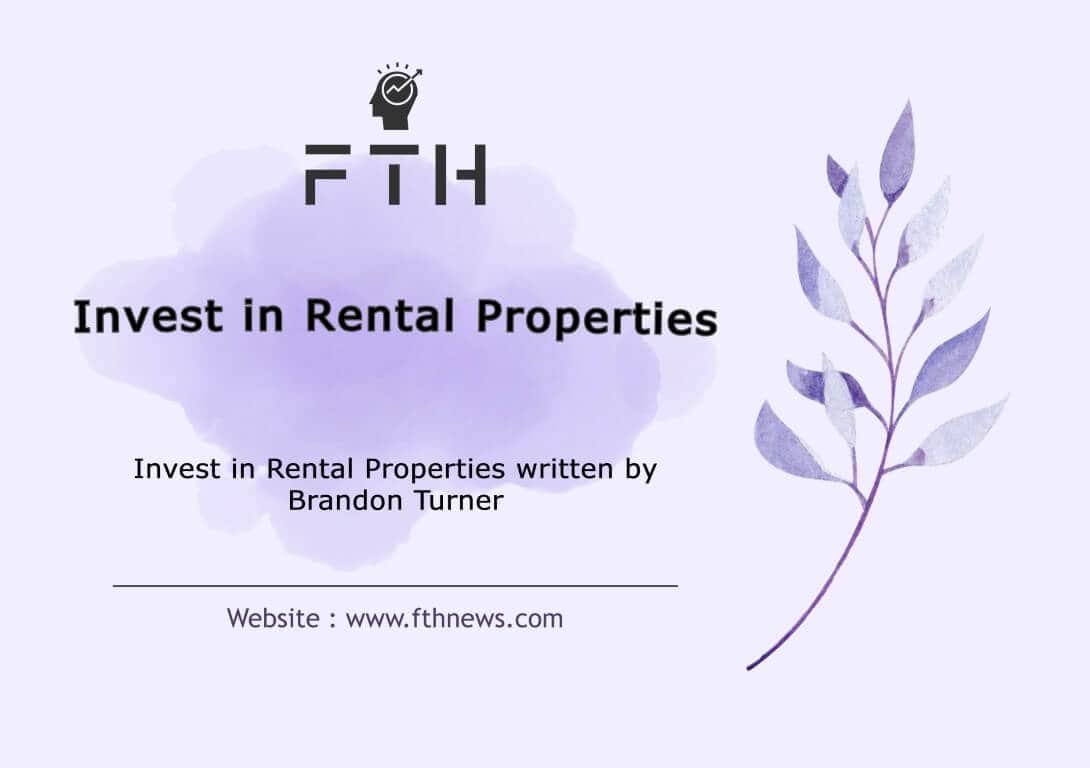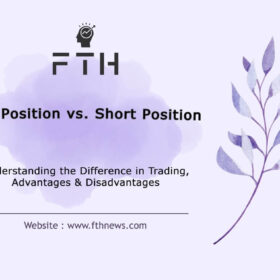
Invest in Rental Properties The Ultimate Guide by Brandon Turner
Invest in Rental Properties written by Brandon Turner explains to you how Invest in Rental Properties can become a passive income during your lifetime and also introduces you to the value of these investments; So stay with us and the summary of this valuable book.
How to Invest In Rental Property
For many, buying their first home is the biggest financial decision of their life, but today we’re going to look at another category: we’re going to explore how you can invest in real estate, not to live there yourself, but to get your cash flowing, which will accelerate your path to financial freedom.
This text summarizes the top 5 recommendations from the book ‘Investing in Rental Properties’ written by Brandon Turner.”
Why Should You Invest in Rental Properties?
Here’s a look at some of the pros:
Leverage: Do you need $200,000 in cash to buy a property worth $200,000? Fortunately not. When investing in real estate, one of the most accessible ways to expedite your progress and increase your return on capital is by borrowing money from others.
Efficiency: The more time you dedicate to this endeavor, the more productive you can be. This includes activities such as renovating properties, networking to find better mortgage deals, and spending time searching for the best real estate opportunities.
Information Sharing: In the stock market, using non-public information can lead to legal consequences, but in real estate investing, discussing the benefits of such information is encouraged. There are several ways to profit and four primary methods to increase your wealth through rental property investments, which we will cover in the next section.
Flexibility: Even if you decide to stay in bed on a particular day, you can still make money because your physical presence is not always required.
Are you convinced, or would you like to learn more? If so, stay tuned because our conversation continues.”
Why Should You Not Invest in Rental Properties?
Like many other endeavors in life, investing in rental properties has its downsides. It’s essential to weigh these factors carefully and decide if this type of investment aligns with your goals. I won’t try to persuade you one way or the other, but it’s crucial to consider both sides.
First and foremost, building wealth through rental property investment takes time.
It’s Not a Get-Rich-Quick Scheme
Getting rich through rental property investment demands a commitment to consistent, long-term action. The keywords to remember here are ‘steady action’ and ‘long duration.’
Be prepared for the possibility that your rental property might occupy much of your thoughts and attention.
Thinking About Rental Properties
Rental property owners can deal with stubborn people.
For example, tenants can be very stubborn at times. Some of them have really mastered the art of making excuses for late payments and causing financial damage through paperwork and accounting.
Just like any other business, but if you dislike handling it yourself, you may have to consider outsourcing it to a third party.
Can You Afford to Lose Your Investment?
Just like any other investment activity, financial returns are not guaranteed. With proper research and starting your own rental property investment as a business, you can greatly increase your chances of success.
Multiple Ways to Profit from Rental Properties
Before we talk about whether a rental property deal sounds good, it’s important to know about them. So let’s start with the following:
Evaluate Asset Growth Over Time
For example, if you can sell your home today for $200,000 and you bought it in 1992 for $100,000, your home has increased in value by 100%. In Sweden, this wealth generator has played an important role over the past 30 years, leading everyone to believe that buying your own home is a no-brainer. Buy now, or wait on the sidelines while everyone else gets richer!
There are two types of evaluation:
A) Natural value caused by inflation and scarcity.
B) Compulsory value arising from the repair of the property.
If a rental property can’t generate good cash value for you, you shouldn’t invest in it. Simply put, cash flow refers to how much money is left over from tenant payments after all property costs and loan interest have been paid.
Tax Savings
Tax savings are country-specific, but in most countries around the world, there are tax benefits for owning a rental property.
Paying Off a Loan is Very Interesting
When you get a regular loan from the bank, the payments you make each month consist of two components: principal and interest. Money spent on the principal increases the value of your equity in the property, while interest payments do not. In the early stages of paying off a mortgage, you usually pay more in interest than principal, but over time, this relationship changes. In the final year of the mortgage payment, almost 100% goes toward the principal.
And the important thing is the value of money and the flow of liquidity. However, cash flow is easier to deal with than currency appreciation, so let’s focus on the first one. Cash flow is calculated by adding up all the property’s income and then deducting all the expenses.
Let’s break the two down. Rental income is determined by fair market value, which, in turn, is influenced by factors such as location, number of bedrooms, and the quality of the property. Be sure to stay up-to-date by using sources like local newspapers, online listings, and Craig’s List to determine what the fair market rent for your property is.
Investing in Rental Properties; Division of Costs
According to the book ‘Investing in Rental Properties,’ costs can be divided into two parts:
Operational Costs: These include taxes, interest, insurance, vacancies, repairs, water, garbage, heat, electricity, etc. For example, you can contact your local power company to find out electricity costs.
Capital Expenditures: These are not everyday expenses, but they can significantly impact your investments. Examples include new paint, flooring, a new roof, etc. These improvements can attract attention and increase the value of the property, almost like a Brandon Turner cheat sheet.
Let’s say your property earns $1,500 per month and costs $1,200. That means you will have an amount worth $300 per month or $3,600 per year. Is this good? The answer depends on how much you paid for the property.
Suppose your down payment was $60,000. This means you have ‘control’ and a return of 6% on your capital investment per year. This figure may seem a little low, considering that in the stock market, you can potentially earn around 7-10% per year. However, in real estate, having control over your investment is a significant advantage.”
How Do I Find Deals?
Price is what you pay, value is what you get. You need to shop around to find the best deals. A good rule of thumb is: look at 100 properties, make an offer on 10 of them, and accept 1 of them. A wise investor once told me if more than one out of ten of his offers were accepted, he knew he had too many offers.
What Should You Be Looking For?
Here are some suggestions. Some of them may seem counterintuitive at first, but remember that what seems like a catastrophic problem is actually very easy to fix and will keep prices low, allowing you as an investor to make a profit.
- Sometimes, a small bedroom is one of the easiest problems to solve; despite this, it eliminates 99% of the competition. A hidden third bedroom that converts a property from a two-bedroom to a three-bedroom can immediately increase the rent significantly.
Example
Look for large storage rooms or large bedrooms that can be split into two. A leaky flat roof and/or an unsightly roof may seem like a big problem, but it’s not. It is expensive to repair but relatively simple and fast. Vaulted ceilings in older properties often have separate rooms, a rarity in today’s market, making older properties more affordable.
Today, open spaces are in demand – a combined kitchen, dining room, and living room. Sometimes, turning a labyrinthine home into an open layout is a simple matter. If you have a garden or a forest-like yard, you can enhance them easily. Landscaping is neither difficult nor expensive, yet it eliminates competition and makes your property stand out.
Final Word
Invest in Rental Properties has many positive aspects, such as the ability to use financial leverage and strive for higher returns. However, it also has negative aspects, including the fact that building wealth through this method takes considerable time and dealing with challenging individuals.
Investing in rental properties generates wealth through cash appreciation, cash flow, tax benefits, and loan repayments. A good deal is one where you have positive cash flow and, preferably, as much control as possible. Additionally, look for a property with a problem that can be easily fixed and still outshines the competition. Your future bank account will thank you for it. Utilize your time and abilities to enhance your financial success.
How Profitable Is Owning A Rental Property?
The profitability of Invest in Rental Properties can vary widely based on several factors. Here are some key considerations:
Location: The location of your rental property has a significant impact on its profitability. Properties in high-demand areas with strong job markets and amenities tend to generate higher rental income and appreciation in value.
Property Type: The type of property you invest in matters. Single-family homes, multi-family units, commercial properties, and vacation rentals all have different potential for profitability.
Market Conditions: Economic conditions, housing market trends, and interest rates can influence rental property profitability. In a hot real estate market, property values may appreciate rapidly, but competition for rental properties could increase as well.
Property Management: Effective property management is crucial. If you self-manage, you’ll save on management fees but will need to invest more time.
Financing: The terms of your mortgage or financing arrangement affect profitability. Lower interest rates and favorable financing terms can increase your cash flow.
Expenses: Consider all expenses, including property taxes, insurance, maintenance, and repairs. Proper budgeting is essential to ensure profitability.
Rental Income: Rental income is a significant factor. The rental rate you can charge depends on market conditions, property condition, and amenities. Consistently renting the property at market rates is essential.
Long-Term vs. Short-Term Rentals: Deciding between long-term and short-term rentals (like Airbnb) can impact profitability. Short-term rentals can generate higher income but may involve more work and fluctuating occupancy rates.
Initial Investment: The amount of money you invest upfront, including the down payment and any renovations or improvements, can affect your profitability and return on investment (ROI).
Economic Conditions: Economic factors, such as job growth and population trends in the area, can affect demand for rental properties.
What Is A Major Disadvantage Of Owning Rental Property?
Owning rental property can be a profitable and rewarding investment, but it also comes with its share of disadvantages. One major disadvantage is the potential for:
Tenant-Related Issues: Dealing with tenants can be challenging, and tenant-related issues are one of the significant drawbacks of owning rental property. These issues can include:
Tenant Non-Payment: Some tenants may fail to pay rent on time or stop paying altogether. This can create financial strain for property owners who rely on rental income to cover expenses like mortgages, property taxes, and maintenance.
Property Damage: Tenants may not always take proper care of the property. This can lead to damages that require repairs or renovations, which can be costly and time-consuming.
Tenant Turnover: Frequent turnover of tenants can result in vacancies, which means periods with no rental income. Finding new tenants, screening them, and preparing the property for new occupants can be time-consuming and expensive.
Legal Issues: Rental property ownership involves adherence to various landlord-tenant laws and regulations. Failure to comply with these laws can result in legal disputes, fines, or even eviction challenges.
Property Management: Managing a rental property can be a demanding task. Property owners must handle maintenance requests, respond to tenant concerns, and keep up with property inspections and repairs. Some property owners choose to hire property management companies, which adds an additional expense.
Difficult or Problematic Tenants: Dealing with tenants who engage in disruptive behavior, violate lease agreements, or cause disturbances in the neighborhood can be stressful. Evicting problem tenants can be a time-consuming and legal process.
Liability Concerns: Property owners can be held liable for accidents or injuries that occur on their rental properties. It’s important to have adequate insurance coverage to mitigate these risks.
To address these disadvantages, many rental property owners take steps such as thorough tenant screening, setting clear lease terms, and regular property maintenance. Additionally, having a solid understanding of landlord-tenant laws and investing in good property management practices can help mitigate some of the challenges associated with owning rental property.














